Army chief Waker-Uz-Zaman confronted by junior officers prior to Hasina's ouster: A report by The Week of India says
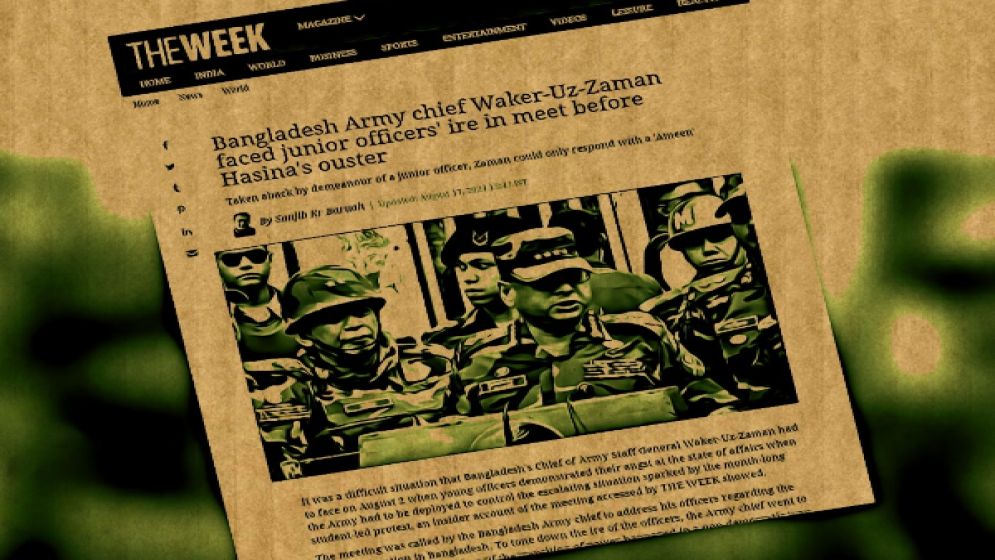
Bangladesh’s Chief of Army Staff, General Waker-Uz-Zaman, faced a challenging situation on August 2, when young officers expressed their frustration with the escalating crisis caused by a month-long student-led protest.
An insider’s account of the meeting, obtained by The Week magazine of India, reveals that the General convened the gathering to address his officers about the situation.
To mitigate the officers' discontent, the Army chief warned that if power were transferred in a non-democratic manner, Bangladesh could end up like Kenya or other African nations.
He urged restraint, noting that such large-scale protests had not been seen in the country since 1970 and emphasizing the need for patience.
Despite his efforts, tensions within the Bangladesh Army were high. The meeting concluded with the younger officers' discontent becoming apparent, ultimately leading General Waker-Uz-Zaman to concede to the demand for Prime Minister Sheikh Hasina’s removal.
On August 5, just three days later, Sheikh Hasina was hastily transported by military helicopter to Agartala, India, where a Bangladesh Air Force C-130 was ready to fly her to Hindon Air Base near Delhi, journalist Sanjib Kr Baruah of The Week reported.
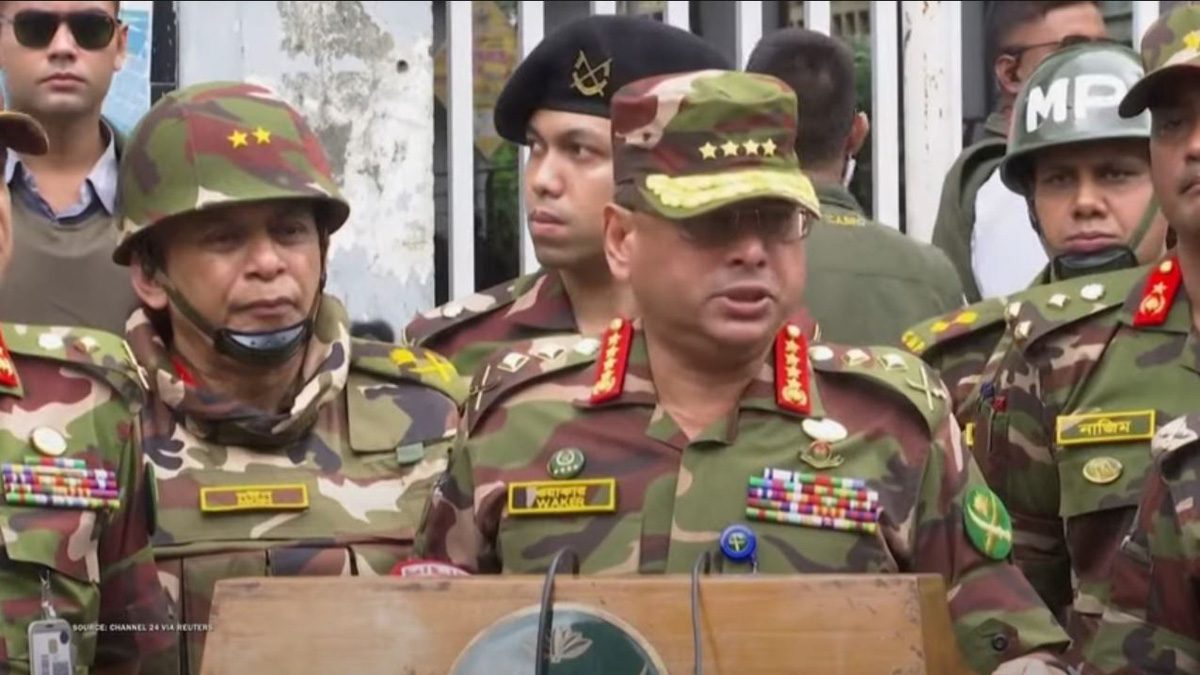
Difficult position for General Waker
General Waker-Uz-Zaman found himself in a difficult position due to his close ties with Prime Minister Sheikh Hasina—he is her appointee and married to her second cousin, which likely heightened his concerns about the unstable situation.
In justifying the Army's deployment amidst the chaos to counter criminal activities and restore order, the General noted that the Bangladesh Army had “performed well,” discharging 1,719 rounds of live ammunition, 14,000 rounds of blank ammunition, and engaging in thirty-one ‘hot situations’ with violent mobs across various locations in Bangladesh.
During the meeting, when invited to address questions from his officers regarding the legitimacy of his actions, young Major Md Ali Haider Bhuyan raised concerns, citing two verses from the Holy Quran that called for divine assistance against oppression and cautioned against complicity in it.
Taken aback by the junior officer's remarks, General Waker-Uz-Zaman could only respond with a subdued ‘Ameen’ (so be it).
Major Hajera Jahan, a female officer, expressed worry about the growing public resentment towards the Army, emphasizing the “pain of losing children and the need for justice.”
The General acknowledged her concerns.
In response to a report from an officer at the Bangladesh Military Academy about unacceptable conduct by some members of the paramilitary Rapid Action Battalion (RAB) and Border Guard Bangladesh (BGB), General Waker-Uz-Zaman assured that these issues would be addressed once the immediate crisis had passed.
Lieutenant Colonel Mahbub, Commanding Officer of the 5 Air Defence Regiment, suggested withdrawing the troops due to decreasing public support, while another officer from Chittagong recommended that the Army work on repairing its image by assisting injured students.
In his concluding remarks, General Waker-Uz-Zaman conveyed the weight of the social pressure and harassment he was facing, quoting a lyric from Ayub Bachchu, a renowned Bangladeshi rocker, composer, and songwriter, reflecting his frustration, reported The Week.
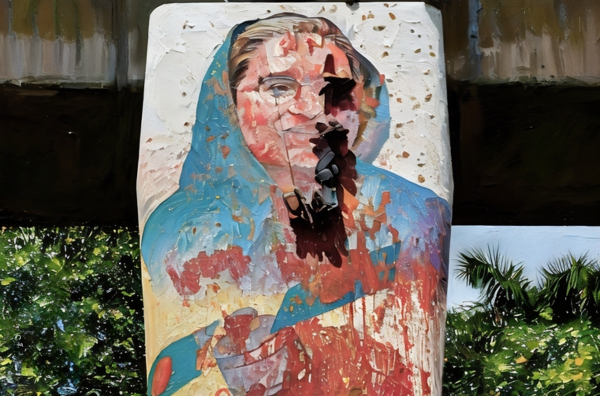
Hasina’s hints of foreign intrusion
Now safely situated in a secure location in Delhi, former Prime Minister Sheikh Hasina has reportedly met with top Indian security officials, including NSA Ajit Doval.
According to a source within the security establishment, Doval would have sought feedback on the recent developments and the sequence of events that led to Hasina's abrupt removal from power.
As charges, including murder, are being leveled against Hasina and her largely absent ministers, the ousted PM broke her silence on Tuesday.
In a statement posted on ‘X’ by her US-based son, she called for an investigation and the identification and punishment of those responsible for the “killings and vandalism” over the past month.
The nationwide protests, which began as an anti-quota movement but evolved into a campaign for Hasina’s removal, have resulted in over 300 deaths.
It remains unclear whether the month-long student-led protests were a genuine uprising or influenced by external forces.
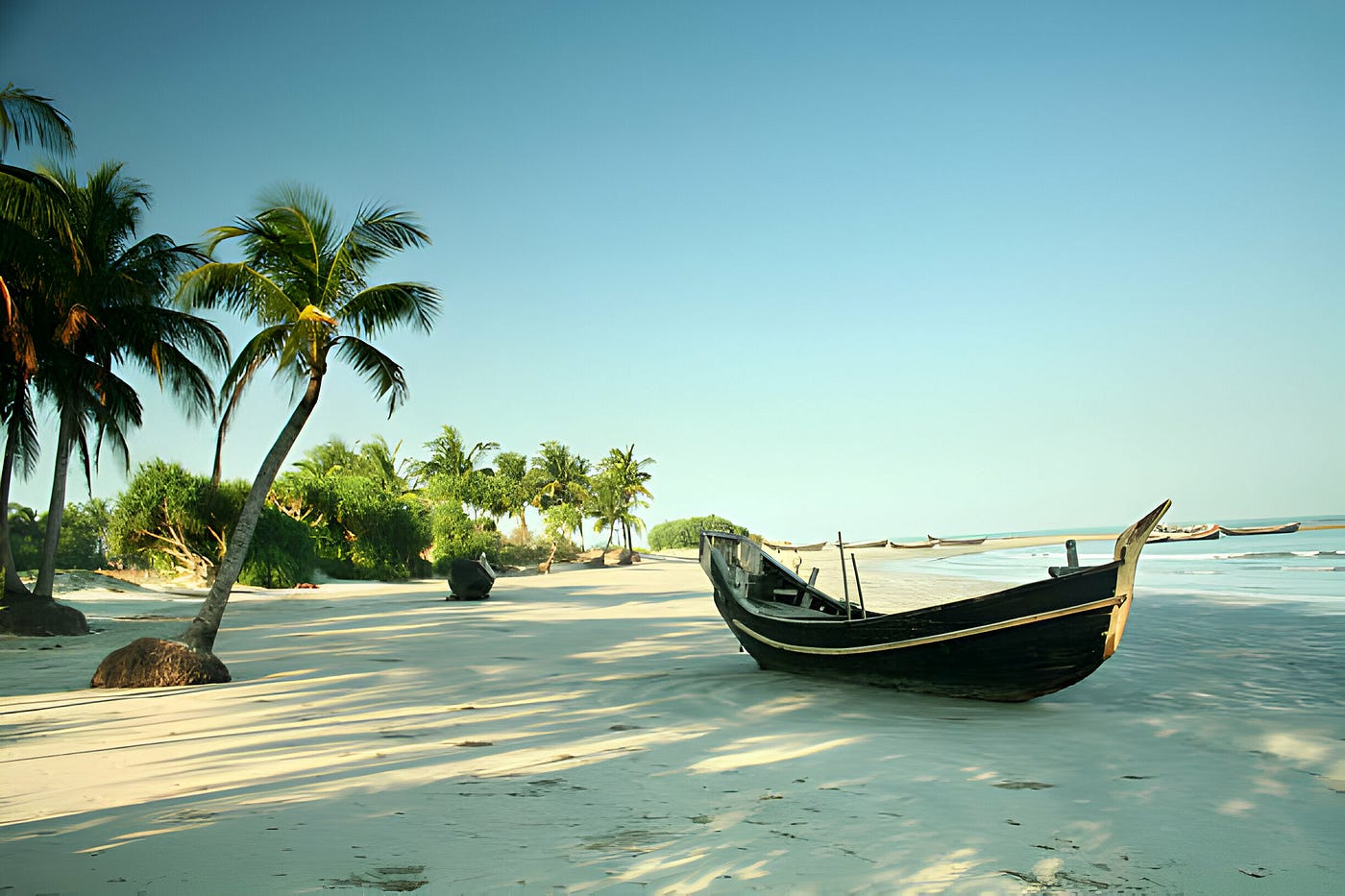
A focal point of the controversy is Narikel Jinjira (Coconut Island), also known as St Martin’s Island, Bangladesh’s only coral island. Covering just eight square kilometers and home to fewer than 4,000 people, mostly fishermen, its strategic location is notable.
Situated about nine kilometers from Bangladesh’s Teknaf peninsula and equally distant from Myanmar’s Rakhine province, the island offers a vantage point to monitor activities in both Bangladesh and Myanmar, as well as the growing Chinese presence in Myanmar.
Interestingly, in June 2023, Hasina hinted at a foreign power's interest in establishing a military base on the island in exchange for supporting her continued leadership in Dhaka. She asserted, “I have no intention of staying in power by selling the country’s assets.” Earlier in January, before the national elections, Hasina claimed that a similar offer had been made by a “white man.”
On Monday, White House press secretary Karine Jean-Pierre rejected claims of US involvement, stating, “We have had no involvement at all. Any reports or rumors suggesting that the United States government was involved in these events are simply false. That is not true.”
However, the White House's subsequent statement clarified their stance on Hasina’s removal: “This is a decision for the Bangladeshi people. We believe that the Bangladeshi people should determine the future of their government, and that is our position.”
While the US maintains a significant naval presence in the Arabian Sea and has a major facility at Diego Garcia in the Indian Ocean, it lacks a substantial presence in the Bay of Bengal. A base on St Martin’s Island could have addressed this gap.
Dhaka-based political analyst Dr. Badiul Alam Mazumdar told The Week, “What we are witnessing is a mass upsurge. The rumors linking this to St Martin’s Island are baseless. The island is too small for a military base; it’s just an excuse.”

Equation of global powers
Additionally, Hasina's strengthening military ties with Beijing, Moscow, and New Delhi have been a concern for the US. Since a defense cooperation agreement in 2002, Bangladesh's military relationship with China has expanded significantly, with Chinese equipment making up 72% of Bangladesh’s military arsenal.
The Bangladesh Navy operates two Chinese Type-035G submarines, and China is assisting in the construction of Bangladesh’s submarine base at Pekua, which is named BNS Sheikh Hasina.
In addition to providing the main battle tank (MBT 2000) and Type-69 medium tanks, China has supplied Bangladesh with a range of military equipment, including anti-tank missiles, rockets, rocket-propelled grenades, mortars, towed artillery, air defense systems (including MANPADS), anti-aircraft guns, radars, and Chengdu F-7 fighter aircraft.
Russia contributes 12 percent of Bangladesh’s military hardware and is also assisting in the construction of Bangladesh’s first nuclear power plant at Rooppur. Through a soft loan covering up to 90 percent of the $12.65 billion project, Russia’s state-owned Rosatom is playing a significant role.
Conversely, India and Bangladesh have been strengthening their military relations, with India offering to help modernize the Bangladeshi military and support capacity building. The ‘India-Bangladesh Shared Vision for Future,’ signed on June 22 during Hasina’s visit to New Delhi, outlines a broad scope of cooperation, including defense. India is offering military equipment such as the indigenous Light Combat Aircraft Tejas and Dhruv helicopters, among other items.
A US military base on St Martin’s Island would, therefore, be strategically advantageous. However, New Delhi is concerned about the prevailing anti-India sentiment in Bangladesh, particularly the attacks on Hindus and the destruction of temples.
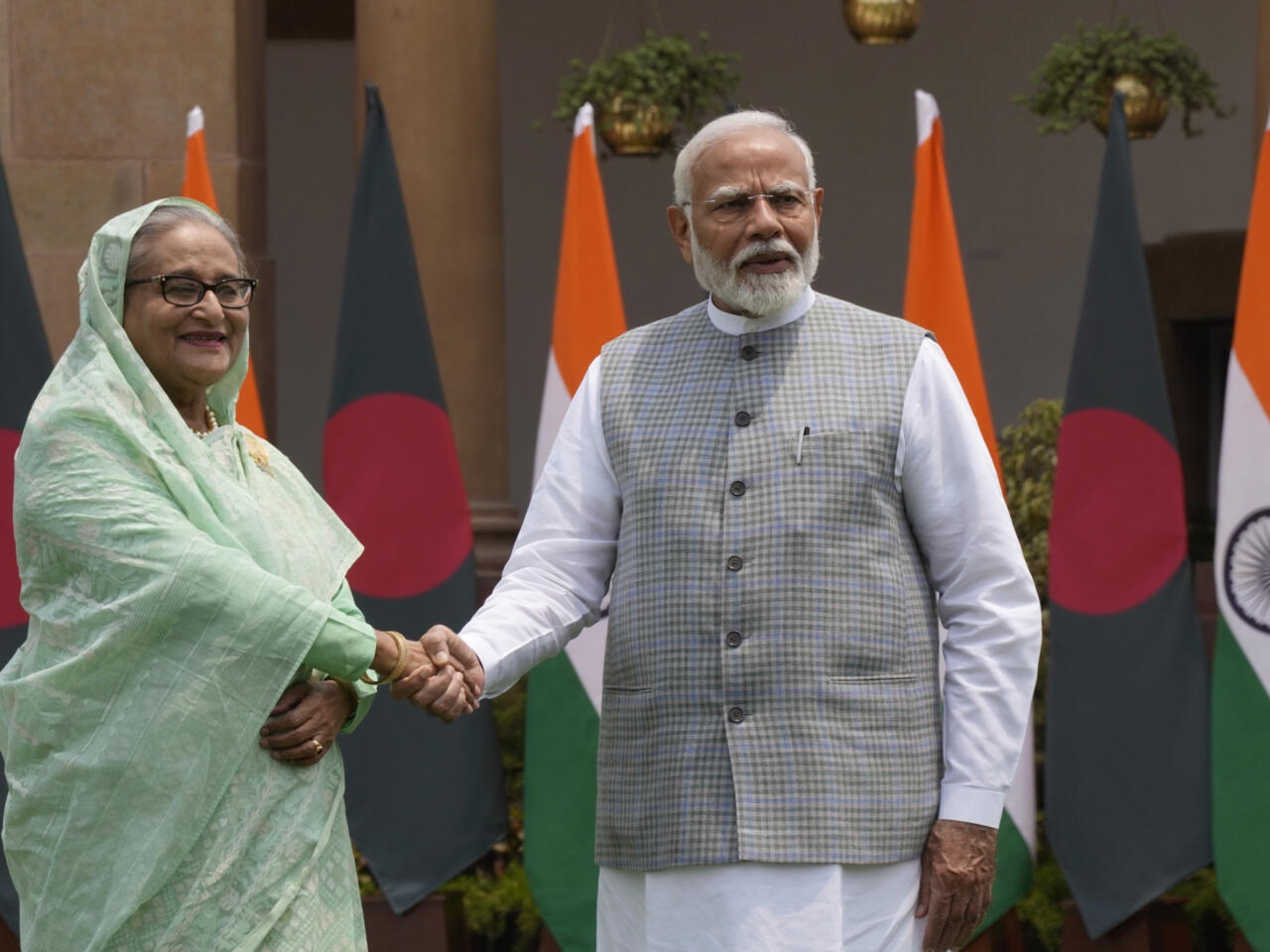
Dr. Debapriya Bhattacharya, a prominent Bangladeshi economist and public policy analyst, explained to The Week: “The Indian government provided unconditional and visible support to the previous government, despite its lack of democratic practices. With the change in government, public discontent and anger have been directed towards India.”
“Unfortunately, Hindus in Bangladesh are often seen as proxies for the Indian government, leading to their targeted attacks. Many of the Hindus who were attacked are also Awami League leaders and supporters. Thus, the attacks were motivated more by political affiliation than by religion.”
Regarding reports of vandalized and toppled statues of ‘Bangabandhu’ Mujibur Rahman, Bhattacharya remarked: “People are still struggling to differentiate between the recent Prime Minister and the founding father. It’s also important to recognize that extreme rightist groups in Bangladesh view these statues as symbols of idolatry and paganism.”
He continued, “These rightist groups have gained influence due to the lack of democratic practices and competitive politics. Their resurgence can be linked to the previous governance style. However, there is broad consensus in Bangladesh that maintaining a strong relationship with India is crucial for future democratic development. I see this as an opportunity,” Bhattacharya added.
Aside from Prime Minister Narendra Modi’s congratulatory message to the Muhammad Yunus-led ‘Interim Government’ on August 9 and External Affairs Minister S. Jaishankar’s parliamentary statement on August 6, New Delhi’s response to the developments in Bangladesh has been relatively restrained.
Sabyasachi Dutta, founder-director of the Shillong-based think tank ‘Asian Confluence,’ noted: “It is natural for the Indian government to be relatively quiet at this time. The situation in Bangladesh is still evolving. The interim government is new and is focusing on stabilizing basic administration such as law and order.”
Rajiv Kumar Bhatia, former Indian ambassador to Myanmar, told The Week: “New Delhi is addressing the situation through diplomatic and security channels. The government might feel it’s best to manage the situation discreetly and avoid making unnecessary public comments at this stage.”
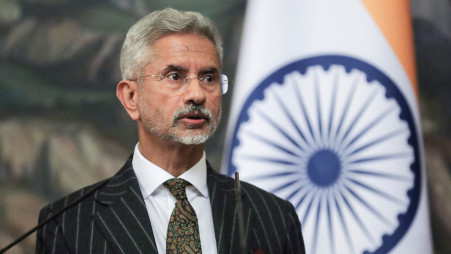
India’s stance on the whole situation
Foreign Minister Jaishankar’s statement in Parliament suggested that India was aware of and advised restraint regarding Hasina’s use of force to suppress the student-led protests. Unfortunately, this advice appeared to be ignored.
Jaishankar also mentioned that India was expected to serve as a transit point for Hasina's departure to another country: “At very short notice, she requested approval to come temporarily to India,” he stated.
India’s strong support for Hasina and her Awami League, while neglecting to engage with the political opposition led by Khaleda Zia’s Bangladesh Nationalist Party (BNP), may have been a significant misstep. However, Hasina’s stay in India could still present an opportunity.
Despite the rapid developments in Bangladesh and Hasina’s ousting, the Awami League and its support network remain influential, and Hasina could still be a valuable asset for India in Bangladesh.
Indian concerns are heightened by the possibility that Pakistan might increase its influence in Bangladesh through its connections with Jamaat-i-Islami and the BNP. Hence, it would be prudent for India to also build relations with the BNP, which is a significant political force alongside the Awami League.
Dr. Mazumdar advised: “The Indian government should definitely engage with the interim government. Meanwhile, Hasina should remain silent. If found guilty after an inquiry, India should return her to Dhaka. The Indian government’s response will be crucial.”
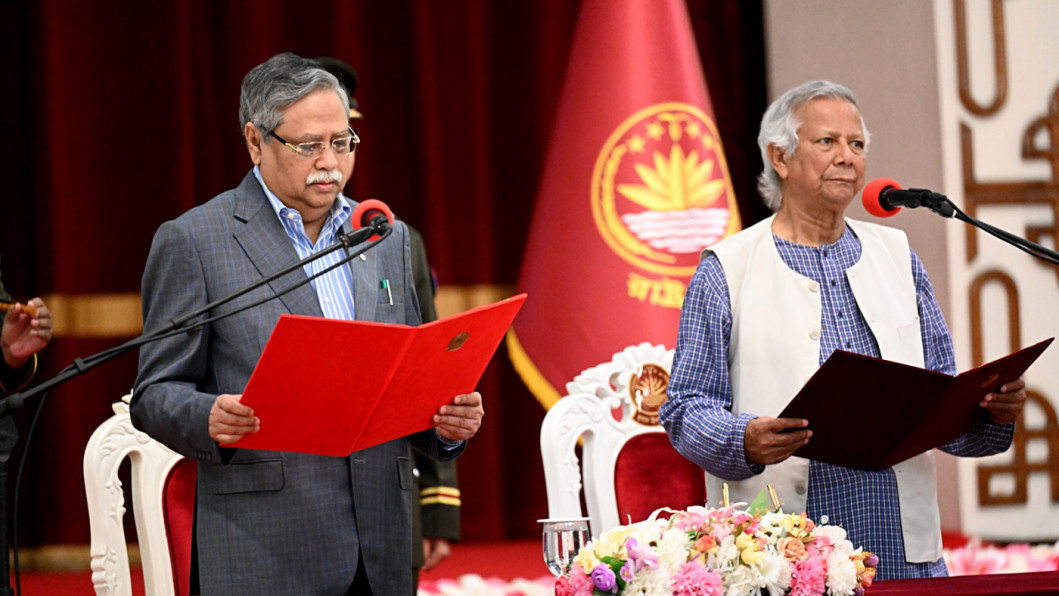
Dutta remarks: “Bangladesh has always been a crucial player in the Bay of Bengal and plays a significant role in India’s Act East Policy. This is beneficial for both sides, as it provides Bangladesh with access to a large nearby market.”
He adds, “Now may be an opportune moment to further activate the ‘Act East Policy.’ India should deepen its engagement with the region, not as a countermeasure but to foster growth and align with geostrategic goals. It’s time to recalibrate and strategize for a mutually beneficial outcome.”
The developments in Bangladesh could lead to several consequences. Insurgent groups from Northeast India, such as ULFA from Assam and UNLF from Manipur, might find new opportunities for establishing safe havens and operating more freely, said the report of The Week.
The mass surrenders of ULFA and UNLF members were largely due to pressure from the Hasina government and the Myanmar military, which worked in coordination with Indian forces.
A new Bangladeshi administration less favorable to India could revive these insurgent activities, posing a significant challenge for New Delhi, which had hoped to have the Northeast insurgents under control.
Additionally, the influx of infiltrators and refugees from Bangladesh into India’s Northeast and West Bengal could become a pressing issue. A less friendly government in Dhaka might also make the narrow ‘Chicken’s Neck’ or Siliguri corridor more vulnerable from a military perspective.
With only 2 percent of the Northeast region’s land border connecting to the mainland and 98 percent surrounded by foreign countries, India will need to reconsider its military tactics and strategies.
Currently, several critical questions remain about the rapid political changes in Bangladesh, including foreign involvement, Hasina’s future, the direction of the interim government, and the prospects for democracy. These issues will need to be addressed as the situation evolves.
—-

